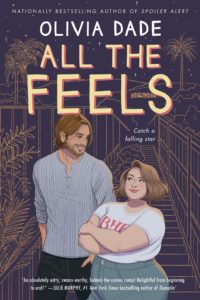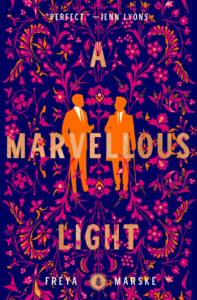Let me begin by saying that I highly recommend both of the books I’m going to talk about in this post, Olivia Dade’s contemporary romance novel All the Feels and Freya Marske’s fantasy romance A Marvellous Light with two Ls because she’s Australian. That’s a little tl;dr for anyone who might just want to know “but should I read these books” rather than receiving a disquisition on what I feel is good about fanfic. Can’t imagine anyone feels that way, but it takes all kinds to make a world. Both of these books are out now, and you should buy them! Quickly, to avoid disappointment in the event of Supply Chain Apocalypse.1
The mainstreaming of fandom has created some deeply weird ripple effects in terms of fan/creator interactions (my hot take is that we should never have wanted this, at least for the large franchises), but one of the best things about it has been that more and more authors are speaking openly about their fannish influences. All the Feels and A Marvellous Light each feel like books that couldn’t have existed without fanfiction, partly because of subject matter, but mostly because they draw so deeply from the well of joy that makes the fannish engine run.
All the Feels is a companion to Spoiler Alert, a romance novel I have recommended prolifically and at loud volume. Like its predecessor, All the Feels follows a lead actor in the television show Game of Thrones Gods of the Gates, which had some good years but is now kind of a mess because its showrunners lack vision and are mean, superficial jerks. In a mean, superficial jerk move, one of the showrunners has hired his very put-upon cousin, an ER therapist named Lauren Clegg, to follow star Alex Woodroe around and make sure he doesn’t get into trouble. This has become necessary after Alex got in a bar fight, but also because he is an agent of chaos. By contrast, Lauren is relentlessly sensible and self-effacing, though like Alex she’s trying to figure out her next moves as her life’s work implodes around her.
A Marvellous Light is a queer fantasy romance set in an alternate version of Edwardian England where everything’s the same except, unbeknownst to most, there is magic. The sunshiney, athletic, slightly laddish Robin Blyth takes a job for which he is numerously unqualified; the most pertinent of his unqualifications is that he has no idea magic exists and it’s kind of a magic-forward job. The job turns out to be its own hotbed of intrigue and murder—as Robin discovers when he meets the magical (but not nearly magical enough to suit his judgmental, Daisy-Fay-from-Gatsby-careless family) bureaucrat Edwin Courcey. Together they uncover a conspiracy that threatens the very foundations of English magic.
A Marvellous Light is notable for its inclusion of explicit sex scenes, which have always been common in romance novels (A Marvellous Light is a romance novel) but whose presence in mainstream commercial SFF is a pretty clear result of having editors, writers, and decision-makers who came out of fandom. As various genres (honestly including tradpub romance novels! and certainly including things like SFF movies; fuck you, Marvel) have become more squeamish about including sex and makeouts, it’s been refreshing to see SFF publishers shift in the opposite direction. A Marvellous Light is the latest of many recent books from Tor, Harper Voyager, and others that have included frank discussions and portrayals of sex. Yay! (Kit Rocha and Jessie Mihalik’s books are, like this one, romances, but recent books by authors like Rivers Solomon and Nghi Vo have also included sex scenes.)2
A Marvellous Light feels especially fannish in the unfussy queerness and careful building of the romance (despite being set in a historical era that was less than friendly to queer love). Marske dispenses quickly with the necessity for Robin and Edwin to conceal their sexual orientation from each other, which allows for her to explore the far more interesting question of what sort of relationship they each want from the other and–crucially–how much of themselves they’re willing to give away. The possibility of romantic and sexual attraction is flawlessly twined around the plot (plant imagery used advisedly): Robin has to spend time with Edwin if he wants his curse lifted (Robin’s under a viscerally nasty curse; I heart folk magic), giving them both plenty of time to gaze yearningly at each other’s hands and dislike each other’s unsatisfactory families.
Freya Marske is open about her background in fandom, and the DNA of fanfic and specifically fanfic sex is all over A Marvellous Light. Her sex scenes, and the scenes leading up to sex, are funny and frank (the two guys realize each other are queer because one of them finds the other one’s, like, porny pamphlet, which is extra funny if you’ve ever read any Victorian or Edwardian porn, all of which is goddamn absurd), and they do this thing that feels inestimably fanficcy to me: Marske’s sex scenes—and the book as a whole—are tender toward the realities of embodiment.
Outside of romance and fic, literature often treats bodies as pure grotesquery, a distraction from the loftier life of the mind. In the first place, I will have no truck with dualism, for it is nonsense. Secondly, this sort of thinking inevitably leads to heightened contempt for bodies perceived as unruly or transgressive, which somehow always belong to marginalized people. An amazing coincidence! And C, hating your body, and bodies generally, really sets a bitch up for failure. We do not actually possess the technology to convert you into a being of pure thought, so you’re kind of stuck with your meatsack, and you might as well be kind to it, even if you do insist on thinking of it as nothing more than the squishy, annoying vehicle that hauls your brain around.
All the Feels is similarly tender about its protagonists’ bodies, which would be par for the course in the romance genre, except that Olivia Dade’s work most wonderfully features protagonists who aren’t cast in one of the, like, three acceptable romance novel heroine physical types. Lauren is petite and round, with sharp features and a beaky nose that makes her look like a bird. As in Spoiler Alert, it’s never suggested that this makes her undesirable to Alex, nor is her body ignored or glossed over during sex scenes. It’s part and parcel of a bigger theme (in both books) of finding within yourself the ability to celebrate your own gifts and strengths, rather than constantly finding fault with your weaknesses.
Lauren is accustomed to people trying to make her feel small, and she no longer reacts to it and doesn’t want Alex to, either. All well and good, until you realize—as Alex does, almost immediately—that she’s fully internalized the idea that she deserves and should expect nothing better than the contempt and snottiness of people who will always, always put her last. On his side, Alex is perpetually terrified that he’ll disappoint the people around him, and perpetually certain that he already has. It’s easy for him to see his flaws and failure, particularly those that arise from his ADHD, but much harder for him to recognize how those same traits make him special, fun, helpful, kind.
A driving impulse of fanfic—though certainly not the only one—is the sense that it doesn’t have to be this way. It’s the source of so much joy in fic, this simple idea to look at a piece of media or, you know, the world, and say, “Actually, I think we can do better than that.” Everybody can be gay! Everybody can have therapy! Everybody lives! For good and ill,3 there’s a critique baked in to what fic writers keep from canon and what they leave behind, a Marie Kondoing of the elements that don’t spark joy in favor of the ones that do.
The major characters arcs of All the Feels and A Marvellous Light are about finding ways to make use of your existing qualities and competencies in a world that’s not set up to find them, or you, valuable. The broader critique, of course, is that it’s all a trap anyway. There’s no middle ground you can find, no level of adherence to the desired standards that can exempt you from being made to feel small. Alex’s ADHD is met with contempt by—mostly jerks, sure, on page, but jerks who have power over him and are trying to persuade him to be less chaotic. Yet on the other side we have Lauren, a person defined by her ability to bring order out of chaos (that’s why she gets this job!), and it’s clear she’s been conditioned to think of herself as kind of a dumpy killjoy. The system has been set up for both of them to fail, and their emotional journeys are about carving out space for themselves and each other to thrive.
In particular, both books treat the gaze of the beloved as a kind of… I don’t know, splint? braces?, a small refuge within which the characters can begin to see themselves the way their love interests immediately saw them. As the least powerfully magical member of his family, Edwin has been subject to near-constant bullying from his siblings. He’s been convinced that his powers are inadequate, and that induced certainty prevents him from recognizing the areas in which he excels. Robin—new to the world of magic—brings a fresh perspective that Edwin allows himself, slowly, to share.
“You invented this system? You applied it?” Robin looked around them at the hundreds, thousands of books. “And you carry the whole thing around in your head?”
“I made a catalogue.” Edwin indicated a small hand-bound volume he hadn’t once touched. “And if you’re going to suggest that I was a very dull child, let me assure you that it would by no means be an original insult.” …
“Remind me not to make an enemy of you, Edwin Courcey,” he said, smiling to show he meant no sting. “I think yours is probably the kind of brain that could run a country.”
IT’S BEAUTIFUL TBH. I too would be very impressed with someone who had deduced the entire Dewey Decimal System from first principles.
I’ve been pretty critical this year of fannish spaces and racism in fandom, and I stand by those critiques. At the same time, it remains true that fandom contains a lot of beauty and tenderness and also thoughtful critique of inequitable social structures. It’s why I keep coming back to fanfic and why I probably always will. All the Feels and A Marvellous Light are both deeply engaged with the best of the fanfic ethos, and it was a pleasure to get to read them.
- I received these review copies from the publisher for review consideration. I am Twitter mutuals with both of these authors. I’m pretty sure that’s not why I loved their books, but who can truly say? Motives are a tangled knot. Also, I am writing this post in late September. By the time it publishes, Supply Chain Apocalypse may already be upon us, in which case, my condolences to the future. ↩
- God, I just thought about The Chosen and the Beautiful again and was again rocked back by how good it was. ↩
- Because cf. how every single fandom treats characters of color, especially Black characters ↩

